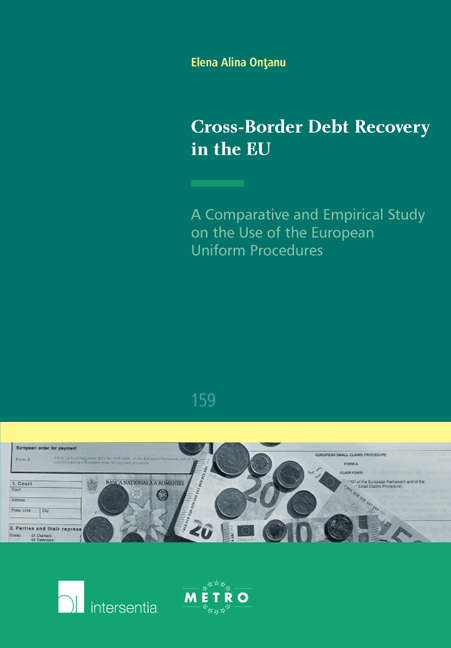 Cross-Border Debt Recovery in the EU
Cross-Border Debt Recovery in the EU Published online by Cambridge University Press: 11 October 2018
The present chapter analyses the findings of the previous chapters on the EOP and the ESCP, focusing on the functioning of these European procedures in England and Wales (hereafter referred to jointly as England), France, Italy, and Romania. The analysed jurisdictions represent the two main legal traditions: common law (England) and civil law (France, Italy, and Romania). The chapter discusses the effects of the European harmonised procedures on cross-border litigation in the selected jurisdictions. Special attention is given to how these uniform instruments (1) are perceived within the national framework; (2) are implemented in the internal system of procedural rule; and (3) are interpreted and function in practice along with national special procedures that have a similar purpose. These aspects are considered in a comparative perspective, acknowledging the similarities and differences that exist between the analysed jurisdictions. Further, the chapter examines elements of the national procedural rules that influence the way in which the EOP and the ESCP are applied, as well as identifies additional reasons that contribute to the present state of the practice. Although this study is confined to four jurisdictions – England, France, Italy, and Romania – the outcome might provide common guidelines that also prove valid for other Member States.
Introduction: A Preliminary Comparative Outline
National Debt Recovery Procedures
To examine whether the European uniform procedures improve the process of crossborder litigation, it is necessary to consider the national procedures that are a functional equivalent to the EOP and the ESCP. In all analysed jurisdictions, national legislation contains specific proceedings for the recovery of contested or uncontested monetary claims, small value claims, or alternative summarised proceedings and/or simplified rules that the creditor can choose to apply when seeking to recover his debt. In certain cases, a specific court also exists to handle smaller and/or simple claims (e.g. Giudice di pace in Italy; Juge de proximité in France). Claimants who pursue the recovery of debts from debtors situated in another Member State have the possibility of choosing between national and European procedures. Furthermore, the rules regulating national procedures may in certain cases apply as well to the EOP and the ESCP.
Generally, the special debt recovery proceedings are handled by the lower or general national courts (e.g. Tribunale or Giudice di pace in Italy; Judecătorie or Tribunal in Romania; District courts in England; TGI, TI or Juge de proximité in France).
To save this book to your Kindle, first ensure [email protected] is added to your Approved Personal Document E-mail List under your Personal Document Settings on the Manage Your Content and Devices page of your Amazon account. Then enter the ‘name’ part of your Kindle email address below. Find out more about saving to your Kindle.
Note you can select to save to either the @free.kindle.com or @kindle.com variations. ‘@free.kindle.com’ emails are free but can only be saved to your device when it is connected to wi-fi. ‘@kindle.com’ emails can be delivered even when you are not connected to wi-fi, but note that service fees apply.
Find out more about the Kindle Personal Document Service.
To save content items to your account, please confirm that you agree to abide by our usage policies. If this is the first time you use this feature, you will be asked to authorise Cambridge Core to connect with your account. Find out more about saving content to Dropbox.
To save content items to your account, please confirm that you agree to abide by our usage policies. If this is the first time you use this feature, you will be asked to authorise Cambridge Core to connect with your account. Find out more about saving content to Google Drive.